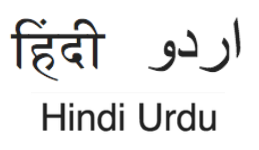Origin of modern Hindi
Hindi is the most widely spoken language in the Indian subcontinent. So it is understandable that many people wrongly assume it to be the national language. In fact Hindi is just one of the many official languages recognised by the Republic and there is no "national language" as per the Indian constitution. Yet there are concerted efforts to impose Hindi on non-Hindi speakers by the Hindi belt speakers. But do these Hindi proponents know the real origins of modern Hindi?
Hindustani language with Khariboli as the root was standardised into separate languages: Hindi (written in the Devanagari script) and Urdu (written in the Persian script), codified and formalised. Their linguistic and literary repertoires were built up accordingly: Urdu borrowing from Persian/Arabic and Hindi borrowing from Sanskrit.
This was probably done under the cunning imperial ‘Divide and Rule’ policy to linguistically segregate religious communities – namely the Hindus and the Muslims – and build schisms, weaken the collective and incite demagoguery which will last through generations, and even centuries.
Given the origin of modern Hindi does it weaken the argument to adopt it as India's national language or impose it on non-Hindi speakers?


Comments
Post a Comment